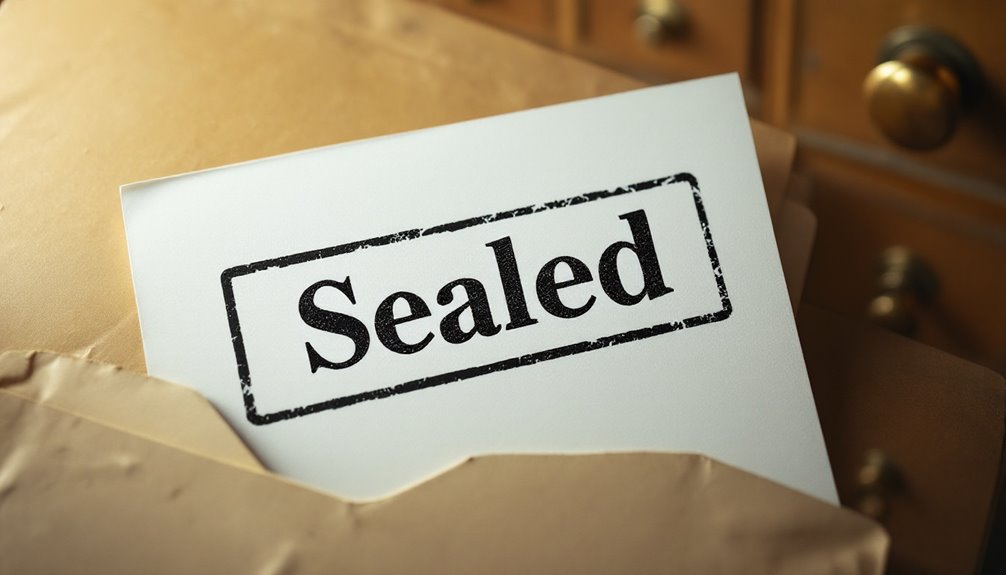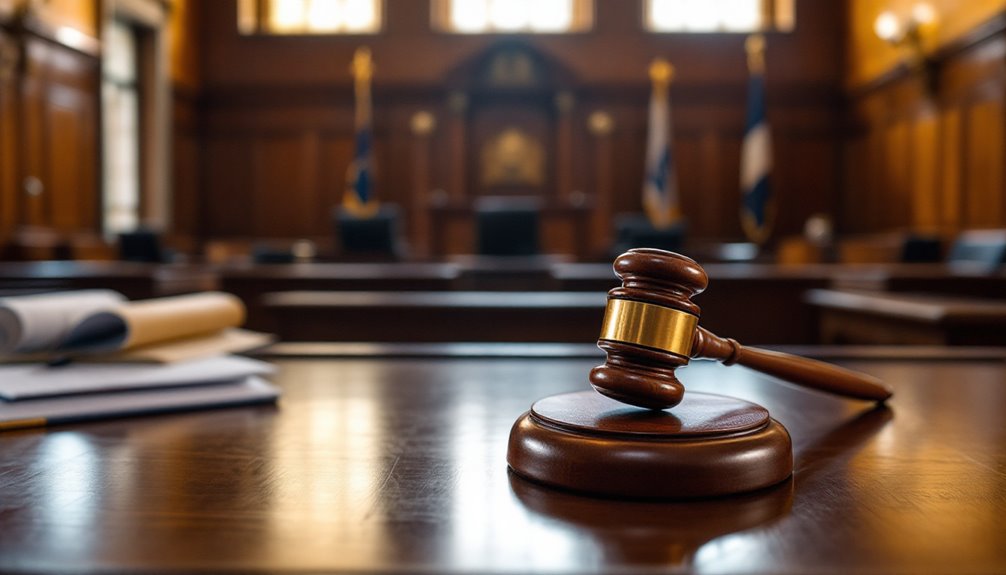Expungement erases criminal convictions from public records, enhancing privacy and providing a fresh start. Eligible individuals can improve job, housing, and educational prospects. It often requires completing a sentence, waiting periods, and clear records during that time. Non-violent misdemeanors and certain felonies might qualify. Gather documents like criminal records and file a petition in court. Expungement reduces recidivism and stigma. Discover more about the process and its benefits here.
Key Takeaways
- Expungement removes a criminal conviction from public records, protecting your privacy and legal rights.
- Eligibility often requires completing your sentence, including probation and fines, and a waiting period without new offenses.
- Non-violent offenses, misdemeanors, and juvenile offenses are commonly eligible for expungement.
- File a petition with necessary documentation in the court where the original case was handled, and notify the District Attorney's Office.
- Expungement enhances job and housing opportunities, improves mental well-being, and reduces recidivism rates.
Understanding Expungement and Its Benefits

Expungement is a legal process that can erase a criminal record. It removes the record of an arrest, conviction, or dismissal from public view. This process provides individuals with a fresh start by protecting their legal rights and privacy. Expungement differs from sealing, as it completely deletes the record. It also differs from a pardon, which forgives but does not erase the record. The benefits are significant. It opens up job and housing opportunities without the stigma of a criminal record. It also enhances educational prospects and access to financial aid. Expungement helps individuals move past their mistakes. It improves mental well-being by removing the burden of past convictions. This legal right allows individuals to reclaim their lives.
Determining Your Eligibility for Expungement

Determining eligibility for expungement involves understanding various factors. Misdemeanor convictions are more likely to be eligible for expungement than felony offenses. Completion of sentence, including probation and fines, is essential. A waiting period is often required, ranging from 1 to 10 years based on jurisdiction and the offense type. In North Carolina, one must wait 5 years after completing a single misdemeanor conviction. Multiple misdemeanor convictions need a 7-year wait. No subsequent felonies or additional crimes during the waiting period are allowed. Charges dismissed or with a not-guilty verdict are eligible without a wait. Affidavits of good character may be necessary. Outstanding restitution or civil judgments disqualify eligibility. Notice to the District Attorney’s Office is usually required. Certain states also consider factors such as rehabilitation efforts and community service when evaluating expungement requests. In cases involving jail credit in California, time spent in custody may impact the overall waiting period before eligibility is granted. Consulting an attorney can help determine the specific requirements based on jurisdiction and individual circumstances.
Types of Crimes That Can Be Expunged

Traversing the process of expunging a criminal record involves understanding which types of crimes are eligible. Generally, misdemeanors and non-violent offenses are often eligible for expungement. This includes charges like public intoxication and prostitution. Minor fraud offenses and non-violent property crimes can also qualify. Several states, like Utah and Washington, allow expungement for some non-violent felonies. Arrests without conviction can be removed from a record as well. Juvenile offenses and first-time drug offenses are frequently eligible. Charges that were dropped or dismissed can also be expunged. Some states allow expungement for infractions and offenses committed by individuals under 25. However, serious crimes like murder, rape, and certain violent offenses are not eligible for expungement in any state.
Gathering Your Criminal Record and Necessary Documents

When seeking to expunge a criminal record, gathering the necessary documents is a vital first step. Begin by obtaining an official copy of the criminal record from the state’s department of public safety or similar agency. Check with the court clerk for the main criminal file and retrieve records from law enforcement agencies or probation offices. Identifying necessary documents is essential. This includes the case number, court transcripts, and details of arrests or charges. Verify the outcome of the case, such as sentences or dismissals. Legal advice may be needed to confirm all documents are correctly assembled. It’s important for those involved in criminal defense to prepare additional requirements like the Order of Expungement and any prosecutor approvals needed. In addition to the aforementioned documents, individuals should also be aware of deadlines and procedural rules specific to their jurisdiction, as these can vary widely. When navigating criminal records in California, it may be necessary to submit a petition to the court that outlines the reasons for expungement and demonstrates rehabilitation since the conviction. Seeking assistance from legal professionals can greatly expedite this process and ensure compliance with all legal requirements, ultimately increasing the chances of a successful expungement.
Researching State Laws and Regulations

Traversing the path to expungement begins with understanding state laws and regulations. Each state has unique eligibility criteria that must be reviewed. For instance, some states automatically expunge certain misdemeanor and less serious felony convictions after set periods. Others, like Florida, require a Certificate of Eligibility before proceeding. Non-conviction records, such as acquittals and dismissed charges, are often considered for expungement. Misdemeanor convictions may also be eligible after a waiting period. Additionally, certain nonviolent felony convictions can qualify under specific conditions. Juvenile records and some marijuana-related offenses are frequently eligible for expungement. Knowing state-specific laws confirms individuals meet the necessary criteria. This research is critical before moving forward with the expungement process.
Preparing Your Expungement Petition

To prepare an expungement petition, one must gather all necessary documents such as proof of sentence completion and criminal records. Understanding state regulations is essential, as each state may have different rules and required forms. It is also important to identify which offenses are eligible for expungement under these laws.
Gathering Relevant Documentation
Frequently, gathering relevant documentation is a crucial step in preparing an expungement petition. Individuals need to collect court records, which include certified copies of case dispositions, original charges, and docket numbers. This confirms all information is accurate and from the correct court. Additionally, probation records are necessary to prove the completion of any probation terms. This includes community service, fines, and rehabilitation programs. Obtaining a certificate from a probation officer can be helpful. A government-issued ID is also required. It verifies the individual's identity and confirms the record matches the correct person. Moreover, background check information and character references can support the petition. These documents collectively form an exhaustive package for the expungement process.
Understanding State Regulations
After collecting all necessary documentation, understanding state regulations becomes the next step in preparing an expungement petition. Expungement laws differ by state, each with its own eligibility criteria. Some states have "Clean Slate" laws for automatic expungements, while others require filing a petition. Waiting periods also vary, typically ranging from three to ten years, based on the offense's severity. The petition must be filed in the court that handled the original case, detailing the offense and justifications for expungement. A court hearing process generally follows, where eligibility is assessed. The prosecution may object, but the court decides if expungement serves justice. Understanding these regulations is essential for a successful expungement process.
Identifying Eligible Offenses
Understanding which offenses are eligible for expungement is a critical step in preparing a petition. Many offenses can be cleared from a person's record, but it's essential to know which ones qualify. Misdemeanors, like disorderly conduct, are often eligible. Up to four can be expunged if there are no felony convictions. Non-violent felony convictions may also be eligible once the sentence is completed and a waiting period is observed. Juvenile offenses and arrests without conviction also qualify for expungement.
Eligible offenses include:
- Misdemeanors – Up to four if no felony convictions.
- Non-violent felonies – After sentence completion and waiting period.
- Juvenile offenses – Under specific conditions.
- Arrests without conviction – Eligible for expungement.
Filing the Petition With the Appropriate Court

To file the petition for expungement, one must first gather all necessary documents, including a certified copy of the criminal record. Understanding the court procedures is essential to guarantee the petition is filed correctly. This includes knowing where to submit the application and any associated fees or notifications required.
Gather Necessary Documents
Kicking off the process of expunging a criminal record requires gathering the right documents. These documents are vital for filing the petition with the court. Essential items to collect include court records and criminal conviction documents. Proof of probation completion is also necessary. To secure success, one should prepare thoroughly. Here's a list of what to gather:
- Court Records: Obtain a certified copy of the conviction and any related documents.
- Probation Completion: Provide proof that probation or jail time has been completed.
- Financial Obligations: Show evidence of payment for all fines and restitution.
- Additional Documents: Collect arrest reports and any records from parole or probation officers.
Accuracy and completeness are vital to avoid delays or denials.
Understand Court Procedures
Traversing court procedures is essential when filing a petition for expungement. Understanding court jurisdiction is vital. File the petition at the court that handled the original case, ensuring it's within the correct county. Each court has distinct policies and fees. The filing process requires completing the petition accurately, attaching necessary documents, and possibly serving it to the district attorney. Pay the filing fee or apply for a waiver if needed. Timely filing is important; notify the prosecutor at least 15 days before the hearing. Post-filing procedures may involve a court hearing within 1-3 months. Be prepared to address objections. If approved, obtain a certified expungement order and submit it to relevant law enforcement agencies.
Navigating the Court Hearing Process

Traversing the court hearing process for expungement involves several critical steps. The petitioner may need to attend a court hearing, particularly if the prosecutor objects to the expungement request. Legal representation can substantially aid in traversing this process. Understanding the prosecutor's role is essential, as they may argue against expungement. The court will ultimately decide based on the evidence and arguments.
- Mandatory Appearance: The petitioner might be required to appear if the prosecutor objects.
- Prosecutor's Role: The prosecutor is informed of the request and may object, prompting a hearing.
- Legal Representation: An expungement lawyer can help present the case effectively.
- Court's Decision: The court will decide on expungement based on the hearing's outcomes.
Factors That May Affect Your Expungement Application

When seeking to have a criminal record expunged, several factors can influence the success of the application. Completion of sentence is vital. This includes fulfilling probation and paying any fines. The type and severity of the offense also matter. Non-violent crimes and misdemeanors are more likely to be expunged. Criminal history and subsequent offenses play a role. A clean record since the conviction is essential. Individuals with a lengthy criminal history may find it harder to succeed. State or local laws vary widely. Some jurisdictions have stricter rules than others. The waiting period after completing a sentence can differ by state. Administrative delays might also affect the process. Understanding these factors can help one navigate the expungement application effectively.
Life After Expungement: Opportunities and Advantages

Understanding the factors affecting expungement applications is only the beginning. Life after expungement offers new opportunities and advantages. It allows individuals to improve their employment and housing prospects substantially. Expungement means they can truthfully answer "no" to having a criminal record, which helps in job applications. Housing options also expand as landlords can't see expunged convictions on background checks. Here are some benefits:
- Employment: Expungement prevents employers from considering expunged convictions, enhancing job prospects.
- Housing: Expunged records improve chances of obtaining rental housing without stigma.
- Restoration of Rights: Expungement can restore voting rights and eligibility for public office.
- Social Benefits: Individuals experience reduced anxiety and better mental health through reintegration into society.
Expungement thereby transforms lives.
Frequently Asked Questions
How Long Does the Expungement Process Typically Take?
The expungement process timeline varies. It usually takes 6 to 12 months. Eligibility assessment and petition preparation can take a few months. Court reviews and hearings add more time, often extending the process. Some states, like Maryland, complete it in 90 days, while others, like Michigan, may take 8 months. Factors include court backlogs, state laws, and offense type. The judge's decision finalizes the process, sealing or destroying records.
Can I Expedite My Expungement Application?
An individual may wonder if it's possible to expedite their expungement application. Yes, expediting is possible under certain conditions. Hiring an experienced attorney can streamline the process. Gathering all necessary documents and filing them promptly is essential. The applicant should verify compliance with state expungement laws. Positive contributions to society and a clean record since the offense can support the case. Expedited expungement provides quicker benefits like improved job prospects.
Are There Any Costs Associated With Expungement?
Expungement involves various costs. Court fees vary by state, with examples like Florida's $100 to $300 range and Virginia's $86 fee. Attorney fees range from $400 to $4,000, based on case complexity. Additional expenses include fingerprinting, certified copies, and background checks. Fees differ due to jurisdictional variations and case details. More serious charges often lead to higher costs. Overall, costs are influenced by local laws and the case's complexity.
Can Legal Representation Increase My Chances of Expungement?
Legal representation can indeed increase expungement chances. Consider Jane, whose lawyer helped expunge her record. Her attorney knew the right forms and deadlines. They addressed objections from prosecutors and answered the judge's questions. Lawyers offer expert guidance, present compelling arguments, and guarantee compliance with procedures. Studies show individuals with legal help succeed more often. Attorneys manage emotional stress, providing moral support and confidentiality throughout the process, increasing the likelihood of a favorable outcome.
What Happens if My Expungement Petition Is Denied?
If an expungement petition is denied, the individual may face ongoing consequences of a criminal record. They could lose employment opportunities, housing options, and face social stigma. The denial might be due to procedural errors, non-compliance, or ineligibility. The person can seek legal advice to understand the reasons for denial and explore options. They may reapply after correcting errors or fulfilling necessary conditions, depending on jurisdictional rules.
Conclusion
In the end, seeking expungement seems like a challenging task, filled with paperwork and legal hurdles. Ironically, the hardest part might just be realizing you're worthy of a fresh start. Once past that, the benefits unfold: better job prospects and social acceptance. It's almost as if society finally accepts what you knew all along—you've changed. So, while the road to expungement is complex, the journey is worth every ironic twist and turn.
